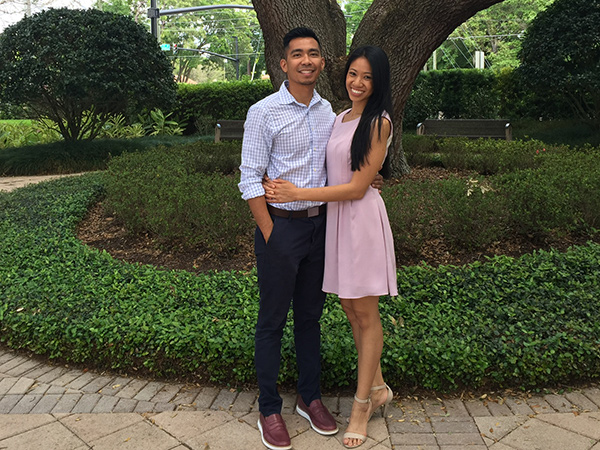Still Living the ATSU mission: Christie Espiritu
Posted: June 28, 2019
Christie Espiritu, PT, DPT, ’13, alumna of A.T. Still University’s Arizona School of Health Sciences (ATSU-ASHS) tells us about her journey to a career as staff physical therapist at Orlando Health in Orlando, Florida.
Q: Tell us about your career in the medical field.
A: As a physical therapist, I provide services that assist in re-establishing function, improving functional mobility, alleviating pain, and preventing or limiting permanent physical disabilities in patients with injury or disease. Being a physical therapist in an acute care setting, my goal is to help my patients return to their prior level of function. These patients may have had a total hip or knee replacement, experienced an acute stroke, or they are experiencing endurance difficulties due to exacerbation of congestive heart failure or chronic obstructive pulmonary disease. If a patient is having any issues that include, but not limited to strength, balance, coordination, activity tolerance, independence in mobility, activities of daily living, range of motion, or motor function, our goal is to strengthen and improve those deficits.
Q: Tell us about your passion for whole person healthcare.
A: I believe it’s most important to consider all aspects of health in our patients. Addressing their symptoms is first, but while also considering their mental and emotional health as well as social factors. I make an effort to refer or redirect a patient to resources or healthcare providers that would be most beneficial to them. I find that mental health is the most common issue my patients face; they are often anxious or depressed or have a history of schizophrenia, bipolar disorder, etc. Taking care of the whole person is crucial in healing our patients fully and thoroughly.
Q: Why were you drawn to ATSU? What is your favorite thing about ATSU?
A: I have a few favorite things about ATSU. What immediately caught my eye about ATSU was their mission in focusing on whole person healthcare, community health, diversity, and underserved populations. I was also drawn to their vision of whole person care. I appreciated the support and encouragement that the physical therapy faculty and staff showed throughout my time in the program. I also felt I could look to them for any issues or problems I had.
Q: What is your most memorable moment at ATSU?
A: My first quarter at ATSU was exciting, but, of course very stressful and a huge adjustment. I moved from Florida and was living by myself with no local family. I was so homesick and also felt unsure of myself about handling the rigors of physical therapy school that I almost left at the end of the quarter. Ann Lee Burch, PT, EdD, MPH, who was our physical therapy program director and now the dean of ATSU-ASHS, immediately asked me to see her in office. I wasn’t quite sure what she was going to say to me and I thought she would try to convince me to stay. She did the opposite. She listened, offered other solutions, and was very patient, kind, understanding, and thoughtful. The care and concern she had for me as an individual was comforting and inspiring. After speaking with her and giving my decision more thought, I decided to stay and I am very grateful I did!
Q: Do you have any hobbies?
A: I really enjoy exercising, but I prefer working out in a class or group of people who are trying to better themselves and live healthy lives. I enjoy reading, riding my bike, watching movies with my fiancé, and eating at new restaurants and dessert shops.
Q: Can you tell me about a memorable experience in your career that changed your perspective?
A: I have too many to count! I was co-treating with occupational therapy and we had a patient who was very disgruntled and wasn’t very happy when we walked into his room to initiate our evaluations. I had a big smile on my face and he looked over at me and said, “What are you smiling for?” I was a little confused, shocked, but I also found it humorous. I took the opportunity to put a smile on my patient’s face and said something along the lines of, “I’m always smiling. Why shouldn’t I be?” We started laughing and my patient’s attitude flipped upside down and began to express his feelings and apologized for his initial attitude. I think it’s most important to really have sympathy and compassion for those going through health struggles. Often times they are frustrated because they don’t have adequate support at home, they don’t have insurance, and the list goes on. I make it a point to not take offense or take anything personal from my patients. Instead, show them kindness, listen and provide the best care they deserve. I’ve found that by doing so, they are most appreciative and grateful.
Q: How do you maintain professional satisfaction?
A: I remind myself why I started doing this in the first place: to help others, to make their experience as pleasant as possible, and to provide excellent care. Despite, the paperwork and pressures to meet productivity, my patients make it all worth it.